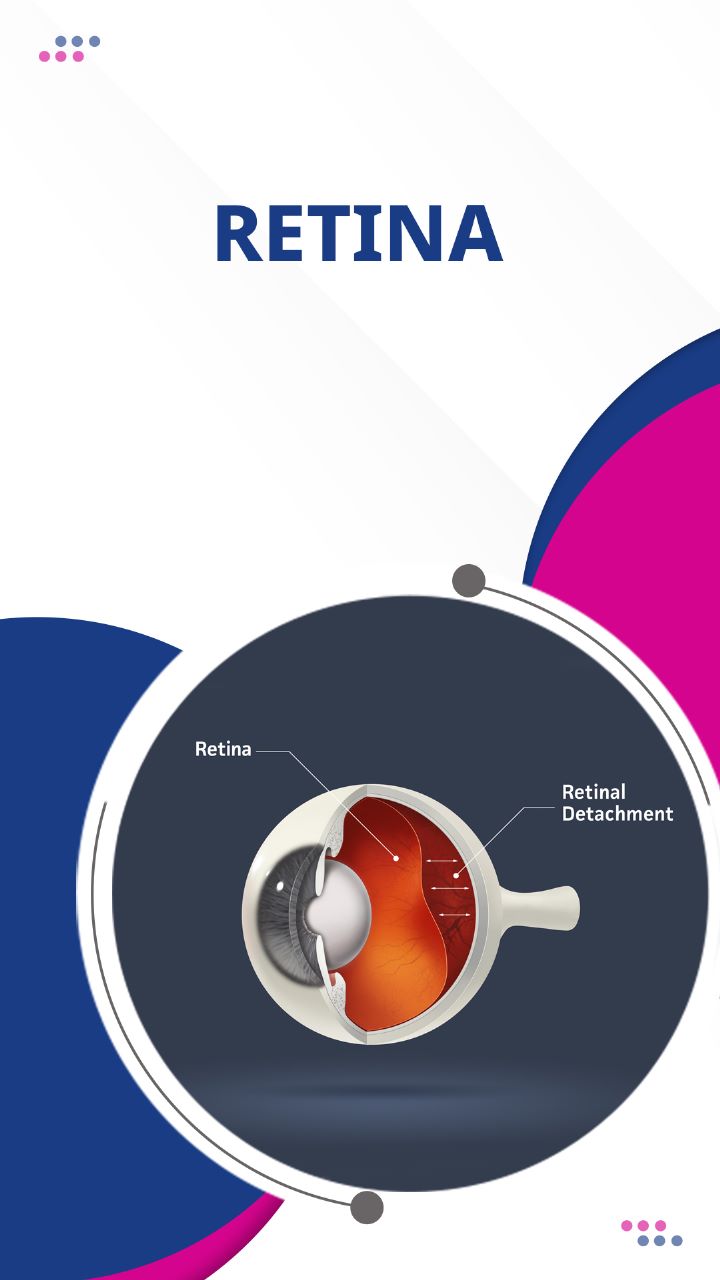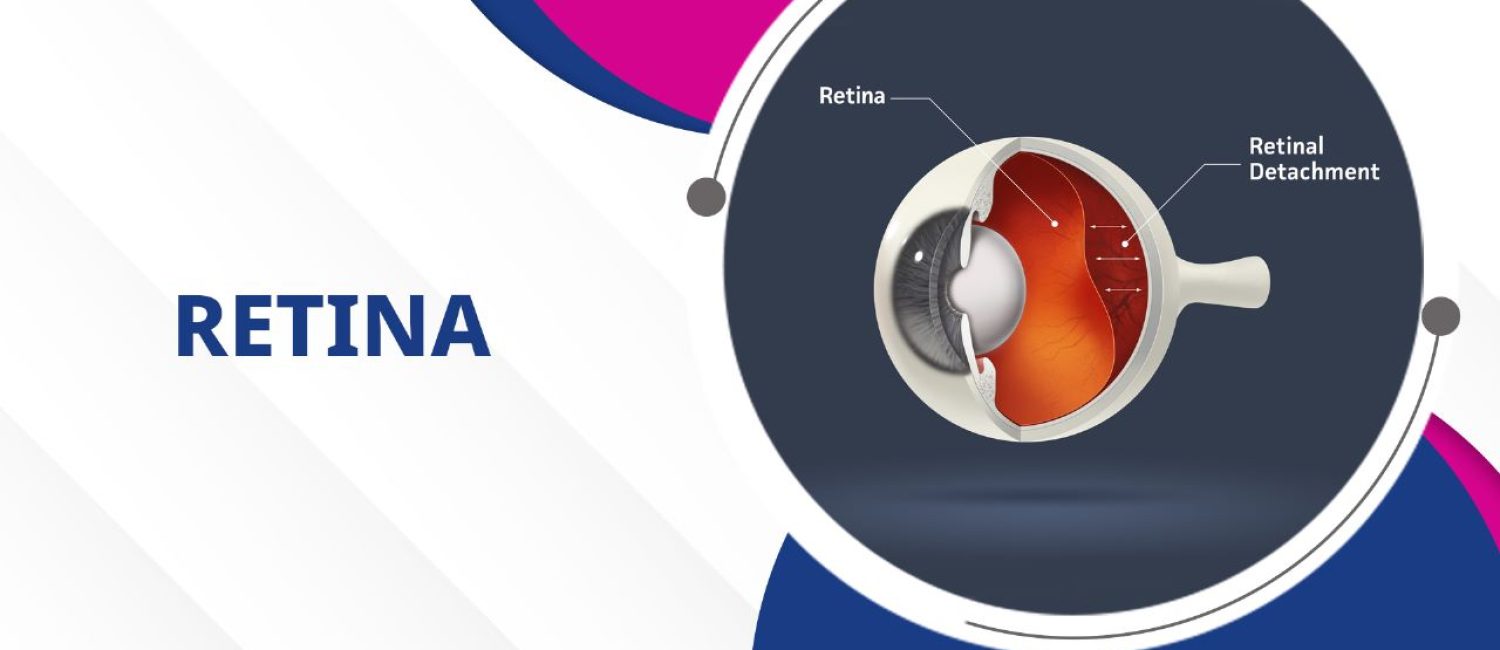

The retina is a delicate, light-sensitive layer located at the back of the eye. It consists of several layers of specialized cells that work together to convert light into electrical signals. This layer receives the images and sends signals to the brain through the optic nerve.
Functions of the Retina
The retina plays a crucial role in the visual process. It performs the following key functions:
- Light Detection: The retina contains specialized cells called photoreceptors (rods and cones) that detect and respond to light.
- Image Formation: Photoreceptor cells convert incoming light into electrical signals, which are then transmitted to the brain. This process forms the basis of image formation.
- Color Vision: Cones, the photoreceptor cells responsible for color vision, are densely concentrated in the central portion of the retina called the macula.
- Central Vision and Detail Perception: The macula, located at the center of the retina, is responsible for sharp, detailed central vision, essential for activities like reading, recognizing faces, and driving.
Retina Diseases
Various conditions can affect the retina, leading to visual impairment or loss. Some common retina problems include:
- Macular Degeneration: This age-related condition affects the macula, causing central vision loss. It can be categorized as dry macular degeneration (gradual thinning of macular tissues) or wet macular degeneration (abnormal blood vessel growth).
- Diabetic Retinopathy: It occurs as a complication of diabetes and damages blood vessels in the retina, leading to vision loss.
- Retinal Detachment: This occurs when the retina becomes separated from the underlying supportive tissue. It requires immediate medical attention to prevent permanent vision loss.
- Retinal Vein Occlusion (RVO): It is a condition where one or more veins in the retina are blocked, causing reduced blood flow and vision problems. It affects the back of the eye and can lead to vision loss.
- Macular Hole: It is a condition that affects the central part of the retina. It occurs when there is a small break or opening in the macula. This can result from age-related changes, trauma to the eye, or certain eye conditions such as high myopia (nearsightedness) or macular pucker.
- Vitreous Hemorrhage: It refers to bleeding that occurs within the vitreous gel, a clear gel-like substance that fills the space between the lens and the retina in the eye. It is typically caused by the leakage of blood from abnormal blood vessels in the retina or other nearby structures.
- Retinitis Pigmentosa (RP): It is an inherited eye disorder causing gradual loss of photoreceptor cells in the retina, leading to vision deterioration over time.
Diagnosing Retina Diseases
Early diagnosis of retina problems is crucial for effective treatment. Ophthalmologists employ various diagnostic procedures, including:
- Dilated Eye Examination: The ophthalmologist uses eye drops to dilate the pupils, allowing a detailed examination of the retina.
- Fluorescein Angiography: A dye is injected into a vein, which highlights the blood vessels in the retina. Photographs are taken to identify abnormalities.
- Optical Coherence Tomography (OCT): This non-invasive imaging technique produces high-resolution cross-sectional images of the retina, enabling detection of retinal thickness and abnormalities.
- Ocular ultrasound: It is used in cases where retina cannot be directly visualized such as advanced cataract or vitreous hemorrhage.
- OCT angiography: This is a noninvasive technique to study the blood flow in the retina.
Symptoms Of Retinal Diseases
- Sudden Decrease In Vision
- Curtain Fall Like Effect In Front Of Eye
- Metamorphopsia (Distorted Vision)
- Flashes
- Floaters
Treatments of Retinal Diseases
Injections- Disease like retinal vein occlusion (CRVO, BRVO), Age Related Macular Degeneration, Diabetic Macular Edema etc. can be treated by injections which are given inside the eye (Intravitreal Injections). This helps in quick and effective treatment of the disease. The procedure is painless and very effective. Repeated monthly injections may be required as advised by the physician as the drug remain inside the eye for a limited period.
There are various injections which can be given inside the eye depending upon the condition. The common ones are avastin, accentrix, razumab, triamcinolone and ozurdex.
Lasers- Certain diseases of the retina require treatment by laser. Common diseases are proliferative diabetic retinopathy, retina tear, weak areas in the retina (lattice) etc . This laser is different from the one used to get rid of glasses. Retinal laser cause no change in the glasses number. The procedure is an outpatient one and requires no major precaution post laser.
Surgery- Disease like retinal detachment, vitreous haemorrhage, macular hole etc. require a surgical procedure known as vitrectomy. Equipment required for vitrectomy include an advanced vitrectomy system, a high quality microscope and a wide angle viewing system. Modern day vitrectomy surgeries are very safe and usually associated with good visual outcomes if done at the appropriate time. It is a day care procedure. Postop prone positioning may be required in certain cases. Silicone oil or gas is usually used at the end of the surgery. Silicone oil needs removal through a small surgical procedure 4-6 months after the primary surgery. Intraocular gas does not require a repeat procedure. However, it is associated with initial blur for few days to weeks.
It is essential to consult with an ophthalmologist for an accurate diagnosis and personalized treatment plan if you experience any vision changes or concerns related to your retina.
If you’re seeking expert care for your retina-related concerns in Chembur, look no further than Dr. Astha Jain at PEEPAL EYE & RETINA Clinic. Dr. Astha Jain is a highly skilled and experienced retina surgeon in Chembur specialist in the diagnosis and treatment of various retina conditions. With her expertise and compassionate approach, Dr. Astha Jain provides comprehensive care to patients, helping them preserve and improve their vision. Whether you’re dealing with macular degeneration, diabetic retinopathy, retinal detachment, or other retina problems.
FAQ
Frequently Ask Questions
Retinal detachment occurs when the retina separates from its normal position at the back of the eye. It is a serious condition that can result in vision loss if not treated promptly.
The retina contains photoreceptor cells, known as rods and cones, which capture light and convert it into electrical signals. These signals are then processed and transmitted through the optic nerve to the brain for interpretation.
While not all retinal diseases can be prevented, there are certain measures that can help reduce the risk or progression of some conditions. These include maintaining a healthy lifestyle, managing systemic conditions like diabetes and hypertension, protecting the eyes from injury, and regular eye examinations to detect and treat any issues early on.
Retina surgery refers to surgical procedures performed on the retina, the light-sensitive tissue located at the back of the eye. These surgeries are typically done to treat conditions such as retinal detachment, macular hole, diabetic retinopathy, or other retinal disorders.
During retina surgery, local anesthesia or general anesthesia is administered to ensure the patient's comfort. As a result, most patients do not experience pain during the procedure.
The extent of vision improvement following retina surgery depends on several factors, including the underlying condition, the severity of the retinal damage, and the success of the surgical procedure. In some cases, vision can be significantly improved or restored, while in others, the goal may be to stabilize or prevent further vision.
The success rate of retina surgery depends on various factors, including the specific condition being treated, the expertise of the surgeon, and the patient's overall eye health. In many cases, retina surgery can be highly successful in restoring or improving vision and preventing further complications.
